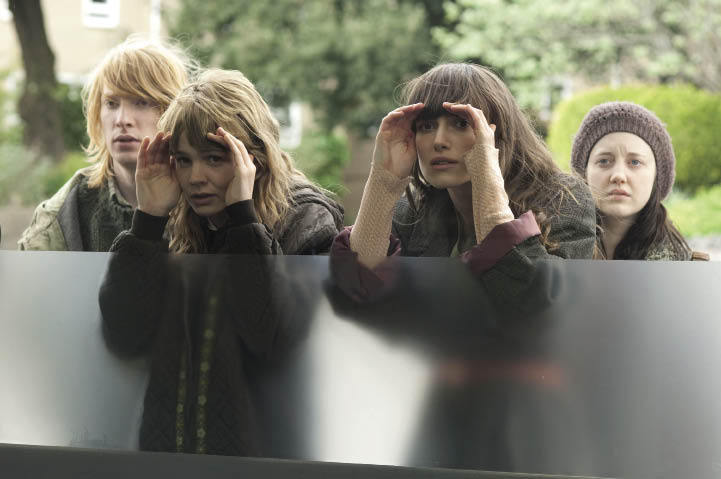I didn’t go and see the Coen brothers’ remake of True Grit this week because I couldn’t get excited about it and don’t like westerns anyhow.
I didn’t go and see the Coen brothers’ remake of True Grit this week because I couldn’t get excited about it and don’t like westerns anyhow. I don’t think women do, generally. They are too masculine; they are like those competitions to see who can urinate farthest up a wall, but with spurs, guns, a broken lawman who rallies honourably at the end, and tumbleweed rolling by. It’s just not our thing.
Women could never, for example, have made High Noon. Instead, we would have made High Noon-ish, with the added rider: ‘Just get here when you can, love, and if we don’t get round to vengeance today maybe we can do it tomorrow, at High Ten-ish. Does this work for you?’ So, for this reason, I opted for the adaptation of Kazuo Ishiguro’s novel Never Let Me Go, and…? My dears, how one longed for some tumbleweed to roll by. It would have seemed quite thrilling.
Never Let Me Go is, first and foremost, as well as second and secondmost, a spectacularly inert film; so inert that even I, who favours inertness, wanted to go at it with a stick in the hope of beating it into some kind of life. Perhaps such passive solemnity is true to the book, but on screen, along with the sad tinkling piano and the sad violins that just won’t quit, the overall effect is so enervating that you simply don’t feel a damned thing. It was the same with, for example, Jane Campion’s Bright Star. It did all the right things in all the right places, but was so painterly and restrained and in such good taste it could not draw you in emotionally. Indeed, when Keats began to cough, instead of feeling moved or distressed, you simply thought, ‘Oh, good. Not long to go now.’ And that is just what this is like.
This is a sci-fi fable although not in the usual futuristic sense. It’s set in the England of today, but it is an alternative England, always slightly off-kilter somehow. People use the words ‘originals’ and ‘donors’ and ‘completions’ ominously. Biomedical tinkering appears to be going on at the edges. As directed by Mark Romanek, the atmosphere is always quietly disturbing.
The story begins in the 1990s with our narrator, Kathy (Carey Mulligan), describing herself as a ‘carer’ and reminiscing about her childhood while watching a man, Tommy (Andrew Garfield), being prepared for an operation. Along with their friend Ruth (Keira Knightley), Kathy and Tommy grew up at Hailsham, a boarding school set deep in the countryside. The flashbacks show them doing what children do — playing; squabbling; tantruming; giggling about sex — but, again, it’s all slightly off-kilter.
All the children at the school are parentless. They are not allowed beyond the gates. They are being raised for a specific purpose which only becomes apparent when, one day, a teacher (Sally Hawkins) suddenly decides to tell them the truth. It is a shocking truth, but is so politely delivered and so politely accepted we never feel the full horror of it. Why didn’t any of the children react, or at least ask: why? Children are always asking ‘why?’. It can drive you mad. Perhaps their submissiveness is part of the story, which is fair enough, but it means nothing ever properly gets going. It is obsessively melancholic.
The film certainly asks its own questions, and these are big questions: what is it to be human? Does our ability to love make us human? What becomes meaningful once you know your life will be curtailed? And attempts to address them through the love triangle that is Kathy and Ruth and Tommy, although this is mostly Carey Mulligan’s film. As the piano sadly tinkles and the violins do that sad violin thing, the camera rarely strays from her face. Luckily, Miss Mulligan is a highly watchable actress who has a highly watchable face but, still, I don’t think I need to see her welling up for quite a while now. As for Ms Knightley and Mr Garfield, they were really neither here nor there. They did all the right things in all the right places, but Alex Garland’s script is too vague and discreet ever to bring them alive.
This is one of those films that never breaks though the falseness of being just what it is: a film. It is rather beautiful, in its languid way, but just as the characters do not know how to express themselves, neither does this. I think I’d have preferred that broken-down lawman who rallies honourably in the end. Sorry, I can see now I’ve let you all down. I will punish myself, probably tomorrow at High-Elevenish. It is only what I deserve.






Comments